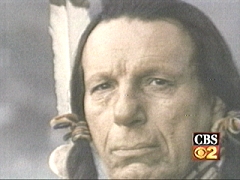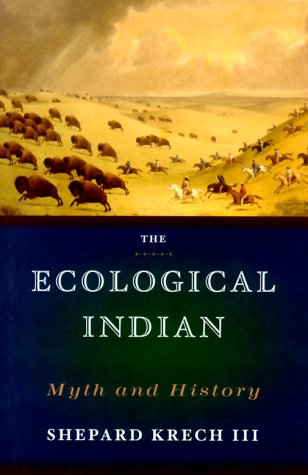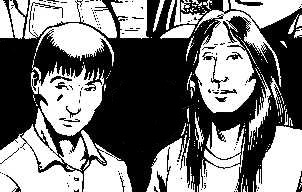 In which Billy and Drew pass the time on the long drive home from a distant pueblo:
In which Billy and Drew pass the time on the long drive home from a distant pueblo: In which Billy and Drew pass the time on the long drive home from a distant pueblo:
In which Billy and Drew pass the time on the long drive home from a distant pueblo:
This book I read slays me.
A real killer, eh?
I can't believe it got a good review in the New York Times.
All right, let's go. Get it out of your system.
The Ecological Indian, by someone named Shepard Krech III. Have you read it?
"Read"? Moi?
Oh, right. Sorry, what was I thinking?
I'm an artiste, my good man. My hands are my instruments. My pictures are worth a thousand words. Etc.
But you only get Playboy for the articles, right?
I see we understand each other.
Anyhow, this fellow Krech sets out to prove his thesis. Namely—
—that we skins are the original ecologists? Good. I couldn't agree more.
No, that's exactly what he sets out to dis-prove.
Eh?
His touchstone seems to be the Iron Eyes Cody commercial from the '70s. You know, the one with him crying?
Ol' Iron Eyes, the Italian Stallion? Just the thought of him brings a tear to my eyes.
His thesis is that the Eco-Indian is a stereotype, if not a myth. He sets out to prove it.
Lead on, McGuffey. I'm listening.
Okay, seven chapters. The first one is on prehistoric extinctions.
You mean dinosaurs and such? Is he blaming us for that?
No, no. A bunch of animals died out around the time of the last Ice Age. One theory is that the proto-Indians did them in.
Proto-Indians? Who dat?
You know, the people who came over the Bering Strait.
Our ancestors have always lived right here.
I'm talking about science, not legend. The experts say our ancestors came across land bridges during the various Ice Ages.
Bridges? We don't need no stinkin' bridges.
Ba-dum-bum. Any-how, he massages the theories and concludes the prehistoric people, whoever they were, may have played a role in the extinctions.
Whoo, a daring conclusion. Them's fightin' words.
My thought was, so what? If those people were our ancestors, they're so removed in time it's irrelevant. Their culture wasn't our culture. Catch my drift?
Indubitably.
Next, he assesses competing claims about the aboriginal population of the Americas. After much debate with himself, he concludes that the middle estimate is probably best because, well, the extreme estimates are too extreme.
And this is relevant to his eco-theory how?
It isn't. That's the point. I think Krech wanted to imply that a certain population size would've caused a certain amount of ecological damage. But whether the population was large or small, he doesn't link it to any particular Indian culture. So people cause damage. Period.
Exclamation point.
Next comes the Hohokam and their extensive series of canals.
Ah, now we're talking about our neighbors.
His basic argument is that canals were a serious modification of the environment. They led to oversalinization of the water table, or something like that. True ecologists wouldn't have tolerated it. Instead of canals, they'd have—I don't know—huddled around the old watering hole, I guess.
As an Eco-Indian myself, I'm opposed to oversalamification.
Salinization.
Whatever.
My counterargument is this. One: Large gatherings of Indians were the exception, not the rule. Two: Whenever large numbers of people gather, they inevitably need infrastructure. Such as canals. Three: The necessity of infrastructure doesn't mean they've abandoned their ecological principles. An ecologist doesn't have to go naked in the woods, living off fruits and berries, to prove his ecological mettle. Today's conservationists don't hew to that standard, so why should we hold Indians to it?
Got me. I'm still trying to get the picture of a butt-naked ecologist out of my mind.
Moreover, Krech says nothing about Chaco Canyon, Cahokia, or Tenochtitlán in Mexico. Why not, since these population centers would probably bolster his case? It's almost as if he's picking and choosing his examples without assessing the overall milieu. That should raise some caution flags.
Mine's flying at half-mast already.
Next, fire.
Okay, pow!
I mean setting fires. Krech points out that Indians often started fires. Generally for ecologically sound reasons such as clearing out the brush or causing berries and what-not to grow. But occasionally they set fires to roust their enemies. Occasionally the fires got out of control.
I suppose a good camper wouldn't have lit a fire in the first place. Smokey the Bear wouldn't approve.
It's ridiculous. Does he think Indians glided through the woods like ninjas, without so much as breaking a twig?
Not many woods in this neck of the woods. Not much fire, either.
Right. Krech doesn't specify where all these fires occurred, another shortcoming in his analysis.
I don't suppose our Inuit buddies caused many.
Most of the fires were reported by white explorers and settlers, which is yet another problem.
White man speaketh with forked tongue.
The long and short of it is: Of course the Natives affected their environment. They hunted animals. They cut down trees. They set fires. They're living creatures, so interacting with their environment is a given.
I bet those endless herds of buffalo trampled a few shrubs when they stampeded. Probably splattered a few woodchucks, too.
Now that's a lovely thought.
Special of the day: Prairie dog pancakes.
Ewww.
Just painting a word picture using a colorful metaphor.
Thank you, Jackson Pollock.
We're natural-born storytellers, you know.
<sigh> Point is, can creatures who are part of the environment be ecologically unsound? Can Mother Nature herself harm nature?
Not unless she's been drinking again.
We know cattle and sheep strip the land bare—but Anglo ranchers introduced them. We know Oklahoma became a barren Dust Bowl—but Anglo farmers caused it. So again, one might ask, who's the ecological offender?
Not a coupla NDNs hunting....
Which is a perfect segue to the next chapter on—
—the buffalo? The Indian's best friend and full-service buffet?
Here Krech makes much of the buffalo jumps, enclosures, and other means of large-scale killings.
Buffalo run off cliff. Fall down and go boom. Make-um heap big heap.
Krech admits Indians used the whole buffalo, down to the last drop, in theory. But when they stampeded them over the cliffs, what do you think happened? They couldn't stop the herd when they had exactly enough buffalo. The beasts kept running over the edge. They kept piling onto the pile.

Poor buffalo people.
He admits the Indians used all of the buffalo on top of the heap. Further down, they might've dug only enough to get the humps and tongues—
Love those Rocky Mountain oysters.
—and they didn't take anything from the buffalo buried at the bottom. They let them go to waste.
Imagine that.
Do today's conservationists eat the humps and tongues of every cow slaughtered on their behalf? When someone cuts down a tree to build them a home, do they use every branch or leaf? No, of course not.
My thoughts exactly.
Once again, note the picking and choosing. Did the Indians hunt the whale almost to extinction? How about the timber wolf? The grizzly bear? The bald eagle?
How about the buffalo, for that matter?
As Krech concedes, it was the Europeans who instigated the mass slaughter. Even so, he goes on at length about the Indians and half-Indians who hunted for the white people.
As if they had a lot of choice. Join the system, or die.
You're catching on. Whatever beliefs the Indians had before European contact were pretty much co-opted. For instance, when the white man introduced guns, the Indians had to get them.
To stay in the arms race, so to speak.
And when the white man introduced the demon rum, well...
Pink elephant time.
Pretty much. When they saw the Indians couldn't handle liquor, they flooded the land with it. The Indians had to hunt for goods to pay the rum runners—
—or go into rehab.
So Indians hunted the deer and beaver in massive numbers, which brings us to Krech's last two chapters.
Today is a good day to transition.
Here Krech starts getting really shifty. In one breath he talks about how the Indians hunted, and in the next how the numbers declined. But that isn't a causal link. The European settlers also were hunting deer and beaver at the time.
And doing a good job of it, too.
Krech makes much of a few isolated reports of Indians killing a pod of beavers—
—a bevy of beavers—
—a whatever of beavers, to the last one. As reported by trappers, traders, and Jesuit priests.
And we know how much you can trust the white man's history.
Krech doesn't know that. He accepts most of the testimony uncritically. What's worse—
You mean it gets worse?
—he almost never quotes us about our own history. How many biographies were written of Indians in the 1800s through the early 1900s, when people still lived traditionally? Dozens? Hundreds? Yet he can't find a single Native to speak on what he believed about nature and God's creatures?
It does seem unlikely.
It's so unlikely that I took it as a challenge. Stopped by the library and looked up a copy of Sun Chief.
Finally, one of our people.
This is a Hopi man born in the late 19th century, relating his life some 50 years later, around 1940. Was he trying to be politically correct in 1940?
I don't think so.
I don't either. I opened the book at random and flipped a couple of pages. I immediately came across this: "My grandfather told me that all the songbirds are the Sun god's pets, put here to keep the people happy while they work." Is that consistent with an ecological outlook?
It sure as heck beats the pahana's attitude of "Shoot the damn things, they're making a mess."
You've got it. Krech apparently couldn't find one Indian, pre-World War II, who had anything positive to say about nature. Meanwhile, he had no problem finding the testimony of 300-year-old priests.
Those are old priests.
Point is, it's about as evenhanded as Dirty Harry was while nabbing a criminal.
Wherever you go in Indian country, you'll find a preacher trying to save our souls. Say hallelujah!
About the only Indian Krech quotes is Vine Deloria Jr., and then only in brief snippets, when Vine has said something caustic. The result? We Indians sound fanatical about defending our cherished stereotype. The lack of reasoned quotes implies that Krech couldn't find any.
Wow. And someone published this mishmash of theories?
Now you see why I'm getting peeved.
For you, that's something. You'd better calm down. At this rate you'll be grinding your teeth, tossing in your sleep, who knows what?
Krech considers the possibility that the Indians may have had non-Western beliefs. For instance, that the animal spirits they killed would live again. But he ends up making Indians sound hypocritical. If they cared so much about animal spirits, he wonders, why kill animals for their fur? Did the animals give themselves up for that purpose as well as for food?
I suppose he didn't ask any skins what their ancestors believed?
No, he seems suspicious of all Native testimony, as if Indians are likely to protect their own.
Who, us?
In fact, everyone protects their own. You should see how lawyers rally around each other when they're accused of something.
Betcha the anthros protect their own even more.
That's the point, of course. But try suggesting an academic type is biased. Would someone like Krech write a book just to get tenure and earn publicity for himself?
Is Generalisimo Francisco Franco still dead?
If you want a conflict of interest, consider this: Those old-time explorers and priests had a vested interest in exaggerating Indian acts. "Look, they've burned the whole countryside! Slaughtered every animal in sight! They're savages!" The wilder they made the Indians seem, the braver they seemed for venturing out among them.
Good for fundraising, too. "Scary Indians nearby—send money!"
Krech concludes with an epilogue, in which he recounts the follies of the last few decades. For every case where Indians fought against mineral development or waste disposal, there's another where they fought for it. Virtually all his news reports come from the mainstream, establishment media. If you check his endnotes, you'll see he hardly touched an Indian publication.
I'll do that. Right after I pull a few of my teeth.
So our people have evolved with the times. So they've had to make tough choices between land and jobs. The point, again, is that these are examples of Indians buying into the American system—the only system left. Do they have much choice? Not really.
They certainly can't depend on the treaties they signed. Talk about your worthless toilet paper.
What it tells us about their original beliefs, or the beliefs they still hold, isn't much. Your average Anglo-American ecologist has bought into the system too. He drives a SUV. He lives in a house twice as big as he needs. He runs the dishwasher half full. He leaves a night-light burning for his children.
Ah, kids. The ultimate ecological disaster.
So Indians weren't pure. And aren't pure. As anyone could tell from this pollution monster we're driving.
Hey, that's my truck you're talking about.
So Krech debunked the old commercial. I'll grant him that much. It was a slipshod job, but the evidence is persuasive. We aren't as perfect as the Iron Eyes stereotype.
In other words, we aren't noble savages, nature-worshippers, or eco-Indians after all. We're...we're...real people.
In living color.
With warts and all!
But where's the proof of anything else? Krech has skipped over large stretches of time and space to cherry-pick his examples. If a 16th century Cree band killed too many beaver near the Great Lakes, does that mean an 18th century Navajo couldn't claim to cherish nature? How about 15th century Taino? A 17th century Kwakiutl? A 14th century Lumbee?
Not to mention a 21st century Pueblo guy or two.
You see my point. I could go on and on.
Yes, about 500 tribes' worth. But don't.
You can't draw conclusions about a continent of people from seven—really five—case studies. It would be like saying all whites are violent because a couple of postal workers shot each other. Do we say that?

Not in mixed company.
This book might make a good first draft of the book Krech could've written. Or perhaps a good introductory text on the question of ecological practices. Is it the definitive work on the subject of eco-Indians? Not hardly.
Related links
Dennis Prager and The Ecological Indian
Ecological Indian talk
Uncivilized Indians
Readers respond
NEW! "This is soooooo good."
|
. . . |

|
All material © copyright its original owners, except where noted.
Original text and pictures © copyright 2007 by Robert Schmidt.
Copyrighted material is posted under the Fair Use provision of the Copyright Act,
which allows copying for nonprofit educational uses including criticism and commentary.
Comments sent to the publisher become the property of Blue Corn Comics
and may be used in other postings without permission.